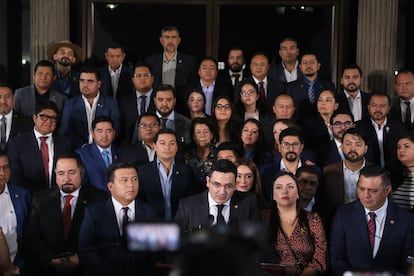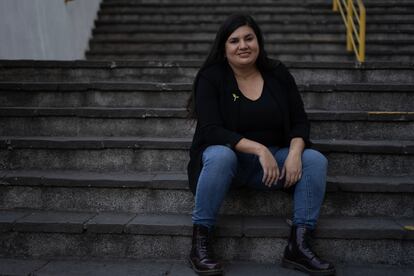In Guatemala, the Seed Movement races against the clock to boost its standing in Congress
The progressive, pro-government legislators are waging a legal battle. They have until the end of the month to reestablish themselves as an official bloc in Congress

Even though this February is a leap year and has 29 days — something that only happens once every four years — everything indicates that (despite the extra day) the ruling Seed Movement won’t have enough time to lead the Congress of Guatemala by the end of the month. This means that it won’t be able to chair the working committees, which will hamper the capacity of the country’s new progressive president, Bernardo Arévalo.
At the moment, the Seed Movement remains suspended as a party. Its legislators cannot be recognized as a bloc. Hence, they are forced to occupy their seats as independents, giving them less collective capacity in the functioning of the legislative body.
The Seed Movement — which brought Arévalo to power when he won the elections in August 2023 — obtained 23 of the 160 seats that make up the Congress for the 2024-2028 period. This is a big leap for the party, which was created in 2018. In the 2020 elections, only seven members of the Seed Movement were elected. The party is now the third-largest in Congress, but since July 2023, it has been engulfed in a losing legal battle.
“There are things that we cannot do as rank-and-file deputies. They even leave us without inspection and intermediation tools, because we don’t have a bloc leadership. It tears us to pieces,” acknowledged Andrea Reyes — a legislator from the Seed Movement — in a statement to EL PAÍS. “We’ve been going around in circles at the courthouse since July 15 [of 2023].”
The provisional suspension of the party began on July 12, 2023, two weeks after the legislative elections. The measure was requested by the Public Prosecutor’s Office and authorized by Judge Fredy Orellana, who is included in the list of individuals deemed corrupt by the U.S. State Department. To-date, his decision stands, thanks to rulings by the Constitutional Court, the most powerful judicial body in the country.
The measure was taken because, allegedly, the Seed Movement used false signatures to obtain its registration as a political party. This resulted in an investigation (that remains confidential) led by the Special Anti-Impunity Prosecutor’s Bureau.
“We don’t have [the committee heads] that the government needs to be able to operate in peace. Several ministers have told us that they need a lot of help with oversight, because there are a lot of pending issues leftover from the previous government. We don’t have the capacity to do that,” Congresswoman Reyes added.

The legal fight to isolate the ruling party had been foreseen by both Arévalo — who mentioned it in interviews with various media outlets before he was sworn in — and by his deputies, who, since their electoral victory, began to file appeals against the party’s suspension. For the presidential inauguration — which took place this past January 14 — the parliamentarians modified the agreement that kept them in suspense. They managed to be sworn in as a bloc and obtain the presidency of the legislative branch. The move worked, but it lasted less than a week.
Subsequently, the Constitutional Court ordered that the election of the Congress’ board of directors be repeated. Samuel Pérez — a legislator from the Seed Movement — was, by then, the president of the Congress. The court then reiterated the suspension of the party’s status.
“The VAMOS party and the UNE [National Unity of Hope] lead the working commissions, so I don’t believe that anything can really be done at the legislative level this year. Therefore, I believe that, at the executive level, the achievements are also going to be limited,” lamented Luis Mack, a political analyst.
A difficult political environment
Congresswoman Reyes notes that the provisional suspension is valid for one year. It should end in July of this year, although the party will continue to defend itself legally in the meantime. However, the time to join the four working committees that remain to be filled is limited: the deadline is February 29. If the party doesn’t regain its status as a proper bloc by then, the opportunity to join will be lost until 2025.
“I would call this an awakening to the reality of a country where winning an election is easier than governing. The Seed Movement administration is still in question. What they have to do is live with that threat, with [the judicial] sector that wants to stop them,” Mack cautioned.
For his part, Edgar Ortiz — a lawyer and expert in constitutional law — tells EL PAÍS that “the times aren’t favorable” for the Seed Movement, but that they have at least three paths that they could choose going forward. One option is to repeal or change the Organized Crime Law, which would get the suspension lifted. The second is to change the rules that govern the operation of Congress and allow independent legislators to form blocs. And a third option would be to wait for Judge Orellana to resolve the unconstitutionality that was raised against them.
“The suspension isn’t eternal, although it could be extended. But they can take action with protections and they do have medium-term tools to reverse the suspension,” said Ortiz. For now, “they’re going to lose the Finance commission, which is the most important for them. That will leave them with the management of the National Budget Committee, which isn’t as active as they would like.” The lawyer has also presented appeals in defense of the Seed Movement, but they’ve been rejected.
According to Reyes, after the Constitutional Court ordered the election of the board of directors to be repeated, the party tried — once again — to be recognized as a bloc. But they didn’t get the votes, because the Public Prosecution and the Constitutional Court “threatened” the deputies of the other parties.
“The calls began coming from the Constitutional Court’s [phone] number. It was so blatant — they didn’t allow the formation of a bloc to advance. The judges told the legislators [from other parties] that they were going to face lawsuits. And they wouldn’t get out of those lawsuits so easily, because they would be seen as [collaborating with] the Seed Movement,” Reyes concluded.
Sign up for our weekly newsletter to get more English-language news coverage from EL PAÍS USA Edition
Tu suscripción se está usando en otro dispositivo
¿Quieres añadir otro usuario a tu suscripción?
Si continúas leyendo en este dispositivo, no se podrá leer en el otro.
FlechaTu suscripción se está usando en otro dispositivo y solo puedes acceder a EL PAÍS desde un dispositivo a la vez.
Si quieres compartir tu cuenta, cambia tu suscripción a la modalidad Premium, así podrás añadir otro usuario. Cada uno accederá con su propia cuenta de email, lo que os permitirá personalizar vuestra experiencia en EL PAÍS.
¿Tienes una suscripción de empresa? Accede aquí para contratar más cuentas.
En el caso de no saber quién está usando tu cuenta, te recomendamos cambiar tu contraseña aquí.
Si decides continuar compartiendo tu cuenta, este mensaje se mostrará en tu dispositivo y en el de la otra persona que está usando tu cuenta de forma indefinida, afectando a tu experiencia de lectura. Puedes consultar aquí los términos y condiciones de la suscripción digital.








































